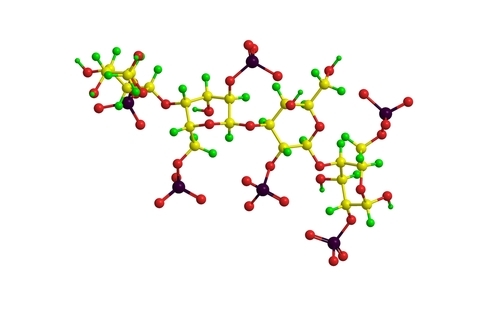Is Carrageenan Bad For You?
Short answer
Yes, carrageenan is bad for you. It contains no nutritional value, and although it comes from what seems like a healthy food, can lead to a variety of health issues.
Category 'F' is for things that fail to bring anything beneficial to the table, and are very harmful to your health. We recommend completely avoiding anything in this category. Long-term side effects of 'F' items are usually very serious.
View Full Grading System
Category 'A'
Very healthy and numerous health benefits. Side effects are rare. Things rated an 'A+' are typically necessary for survival (for example, water).
Very healthy and numerous health benefits. A few harmful qualities may be associated, but only under certain circumstances such as an allergic reaction.
Very healthy and numerous health benefits. Harmful qualities may be associated, but aren't usually serious.
It is important to note that even the best things in life can become bad in immoderate amounts. So, although something may be rated an 'A+', overconsumption/overdoing can bring unwanted effects.
Category 'B'
Very beneficial to your health. Things rated a 'B+' may have a few harmful qualities to pay attention to.
Overall beneficial to your health. Things rated a 'B' may have some harmful qualities to pay attention to.
More beneficial to your health than not. However, harmful qualities are most likely associated and shouldn't be overlooked.
The main difference between category 'A' and category 'B' is the harmful qualities typically present in 'B' items. Serious side effects are usually uncommon, but are still possible and should be taken note of.
Category 'C'
Both beneficial and harmful qualities associated. Things rated a 'C+' are typically a bit more on the beneficial side. Still, moderation is important.
A fairly even ratio of beneficial and harmful qualities. Moderation is important. Very general topics that can lean towards both sides of the spectrum will be placed here as well. Rice, for example, can be good or bad depending on the type.
More harmful than beneficial. Side effects are common, especially when consumed/done excessively. Moderation is very important.
Category 'C' usually denotes to both good and bad qualities. When it comes to this category, it is important to keep this word in mind: moderation.
Category 'D'
Harmful to your health. Although benefits may be associated, the bad most likely outweighs the good. Moderation is very important.
Harmful to your health. A few benefits may be associated, but the bad outweighs the good. Moderation is extremely important.
Harmful to your health. Very few, if any, benefits are present. Things in this category should be avoided as much as possible.
Category 'D' is typically for things that are more harmful than beneficial. While consuming/doing something unhealthy once in a blue moon shouldn't hurt, we definitely recommend eliminating 'D' items as a regular part of your routine/diet.
Category 'F'
Category 'F' is for things that fail to bring anything beneficial to the table, and are very harmful to your health. We recommend completely avoiding anything in this category. Long-term side effects of 'F' items are usually very serious.
Category 'N'
'N' stands for neutral. Things placed into this category are generally (a) neither good nor bad for you, or (b) lack the necessary evidence to reach any conclusions.
Long answer
Carrageenan is a polysaccharide extract from red seaweeds – seems pretty good, right? Seaweed and kelp are considered healthy foods, so why isn’t this?
The food industry uses this substance in many foods to thicken and stabilize foods, even organic products. It acts to keep many liquid products from separating in their packages. It is commonly found in yogurt, chocolate, soy milk and ice cream. Various other milk products including nutritional shakes, along with some frozen dinners, soup and broths, and even some baby formulas also contain the substance.
Not only does carrageenan not have any nutritional value, but your body doesn’t even know how to digest it. In fact, it is so foreign to your body that your immune system reacts to its presence by causing an inflammatory reaction that can further lead to gastrointestinal ulcers and bleeding. Studies began linking carrageenan to ulcerative colitis, gastrointestinal ulcers, and colon cancer over 50 years ago.
Chronic inflammation is possible if consuming this substance regularly, especially along with other inflammatory foods. Chronic inflammation can greatly increase the risk of degenerative brain diseases, heart disease, gut dysbiosis, Candida overgrowth, poor brain health, diabetes, and cancer. Diabetes becomes a risk even with low levels of consumption as it interferes with insulin and promotes glucose intolerance.
Carrageenan was introduced as a food additive in the 1990s when it was approved by the USDA’s National Organic Standards Board. A review was performed by NOSB in April 2016 and they are expected to vote in November 2016 regarding whether or not it should continue to be used in organic foods. The initial approval was found to be based on biased misinformation by corporate scientists and manufacturer lobbying. As of 2012, knowledge of the potential health concerns of consuming carrageenan has been widely known by the organic food industry.
Outside of the food industry, carrageenan is often used in the formulation of medications. It has been used in a variety of medications with reported benefits of decreased pain and swelling, and use as a bulk laxative.
Possible short-term side effects
Possible long-term side effects
- inflammation
-
gut dysbiosis
-
degenerative brain disease
-
diabetes
-
ulcerative colitis
-
colon cancer
Commonly found in
- organic products
-
yogurt
-
milk products
-
frozen dinner meals
-
soups and broths
-
baby formula
-
ice cream
Please turn your Ad Blocker off to see this content. Thank you!
Thank you for your feedback!
Written by Kristin Brown, DC, MS
Published on: 07-02-2016
Last updated: 12-10-2016
Thank you for your feedback!
Written by Kristin Brown, DC, MS
Published on: 07-02-2016
Last updated: 12-10-2016


 Approved by
Approved by 














